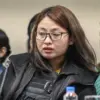Impeached South Korean leader Yoon Suk Yeol was arrested on Wednesday over his failed attempt to impose martial law, ending a weeks-long standoff with authorities and making him the first president in the nation’s history to be detained.
Yoon, facing charges of insurrection related to his brief and controversial effort to declare martial law last month, stated that he would cooperate with investigators to prevent “bloodshed.”
A former prosecutor and leader of the conservative People Power Party (PPP), Yoon could face the death penalty or life imprisonment if convicted of insurrection.
For weeks, Yoon sought to evade arrest by staying in his residence, where loyal members of the Presidential Security Service (PSS) had protected him. His guards fortified the compound with barbed wire and barricades, turning it into what the opposition labeled a “fortress.”
Yoon, who had vowed to “fight to the end,” successfully thwarted an initial arrest attempt on January 3 after a tense, hours-long standoff between his guards and anti-graft investigators working with police.
However, in the early hours of Wednesday, hundreds of police officers and investigators from the Corruption Investigation Office (CIO) once again surrounded the compound. Some scaled walls and navigated back trails to reach the main building.
After a standoff lasting about five hours, authorities announced Yoon’s arrest. The impeached leader then released a pre-recorded video message.
“I decided to respond to the Corruption Investigation Office,” Yoon said, acknowledging he did not accept the legality of the investigation but choosing to comply “to prevent any unfortunate bloodshed.”
Yoon was escorted from his residence in a convoy and taken to the CIO offices, where investigators began questioning him shortly after his arrival, according to Yonhap.
Earlier, AFP reporters witnessed brief scuffles outside the residence as Yoon’s loyal supporters, who had been camped there to protect him, clashed with authorities. Supporters shouted “illegal warrant!” while waving South Korean and American flags, some even lying on the ground outside the compound’s main gate.
Defiant leadership
Yoon’s declaration of martial law on December 3 had shocked the nation. He claimed the move was necessary to protect South Korea from North Korea’s communist forces and to eliminate anti-state elements. The declaration saw troops deployed to parliament, but lawmakers defied the move, and Yoon revoked martial law just six hours later.
Following his arrest, Yoon can be held for up to 48 hours. Investigators would need to apply for an additional arrest warrant to keep him in custody.
Yoon’s legal team had repeatedly condemned the warrant as illegal. The ruling PPP also voiced opposition to the arrest, with floor leader Kweon Seong-dong calling the warrant “unjust and illegal” and apologizing to Yoon’s supporters.
Meanwhile, the Constitutional Court initiated a trial on Tuesday to decide on the legality of Yoon’s impeachment. If the court upholds the impeachment, Yoon would lose the presidency, and fresh elections would need to be held within 60 days. The trial was adjourned after a brief hearing on Tuesday, with the next session scheduled for Thursday. The proceedings could last for months.
South Korea’s opposition Democratic Party celebrated Yoon’s detention, calling it “the first step” toward restoring constitutional and legal order after weeks of political turmoil. Parliament Speaker Woo Won-shik echoed these sentiments, stating, “Now that the chaotic situation has ended, we should focus on stabilizing state affairs and restoring the livelihoods of the people.”
AFP


